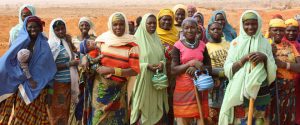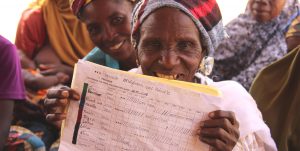by Elaine Wallace
When we hear about the Sahel in the news, it’s often in connection with a humanitarian crisis. Droughts and other disasters regularly push the region into a state of crisis, and the international community usually responds with a large-scale emergency relief effort. In 2012, USAID recognized that these repeated crises occur because communities in the Sahel lack the capacity to withstand adverse events like droughts. They also recognized that emergency relief efforts, which are essential for saving lives, are expensive and do little to address the chronic vulnerability that lies at the root of the crises. In response, USAID adopted a new approach for development in the Sahel. It’s known as “resilience programming,” and its purpose is to build the capacity of local communities to withstand environmental crises. Resilience programming is based on the theory that creating stronger, healthier, and more economically-diverse communities will lead to fewer crises.
The Resilience in the Sahel Enhanced (RISE) program works with communities in Niger and Burkina Faso. One key objective of the RISE program is to empower women. According to USAID, empowering women is critical to building resilient communities. Although women tend to be worse off than men socially and economically, they often have an immense impact on the well-being of others. Building women’s knowledge and skills, increasing their access to assets such as land and livestock, and promoting female leadership improves the economic and physical well-being of the entire community. For example, when women are given the same access to agricultural resources as men, crop yields increase by 20% to 30%, and children tend to be better nourished. Women’s access to these resources strengthens the community by increasing the food supply and improving health.

The RISE program addresses multiple interconnected problems, including chronic poverty, malnutrition, poor health, land degradation, and low agricultural productivity. For example, RISE increases women’s economic engagement by helping them to identify market opportunities, providing the resources and skills needed to take advantage of them, and developing the external systems needed to support them. Since many of the market opportunities are agriculture-based, the project improves economic and physical well-being and helps address ecological problems such as land degradation and low agricultural productivity.
In the Maradi region of Niger, RISE helped women create savings and loan associations to finance small business opportunities. One group of women learned how to transform nutrient-rich niebe (black-eyed peas) into products such as porridge, couscous, and flour for pasta and cookies. They now sell the products at regional markets and agricultural fairs organized by USAID and the Nigerien government and use the proceeds to rent more land, grow more niebe, and buy equipment. The women also planted moringa trees, which mature quickly and produce leaves that are high in protein and vitamins. RISE taught them how to harvest, dry, and grind the leaves into a powder to sell as a food supplement for pregnant and nursing women.

In other communities, RISE trains women to raise sheep and goats for milk, meat, manure, and leather, as well as for offspring that can be sold or given to others in the community to start their own livestock businesses. RISE also teaches agricultural techniques that increase crop yields, such as making compost to enrich soil. By producing more products and bigger yields, these projects bring more food, more economic growth, and stronger, healthier communities. Perhaps just as importantly, they also bring more hope for a better future.
Sources:


